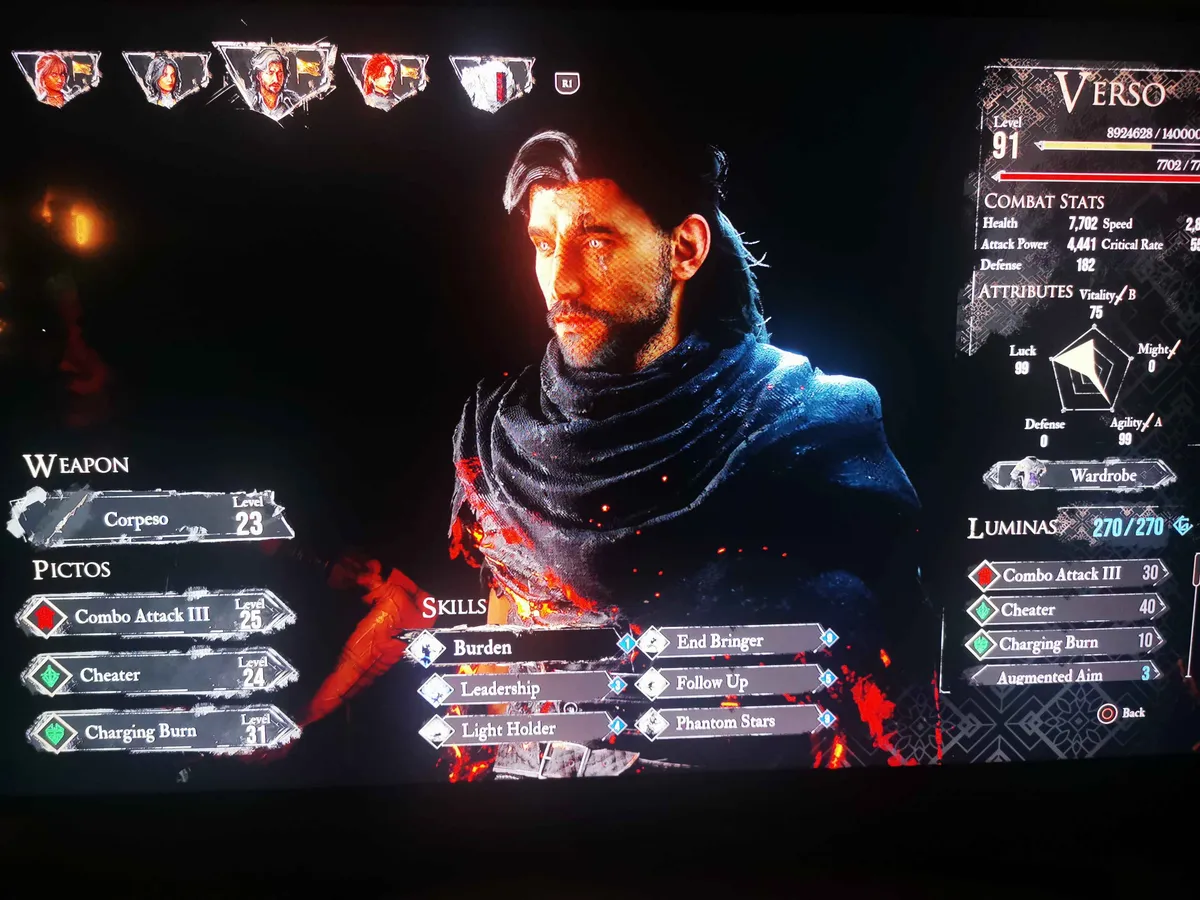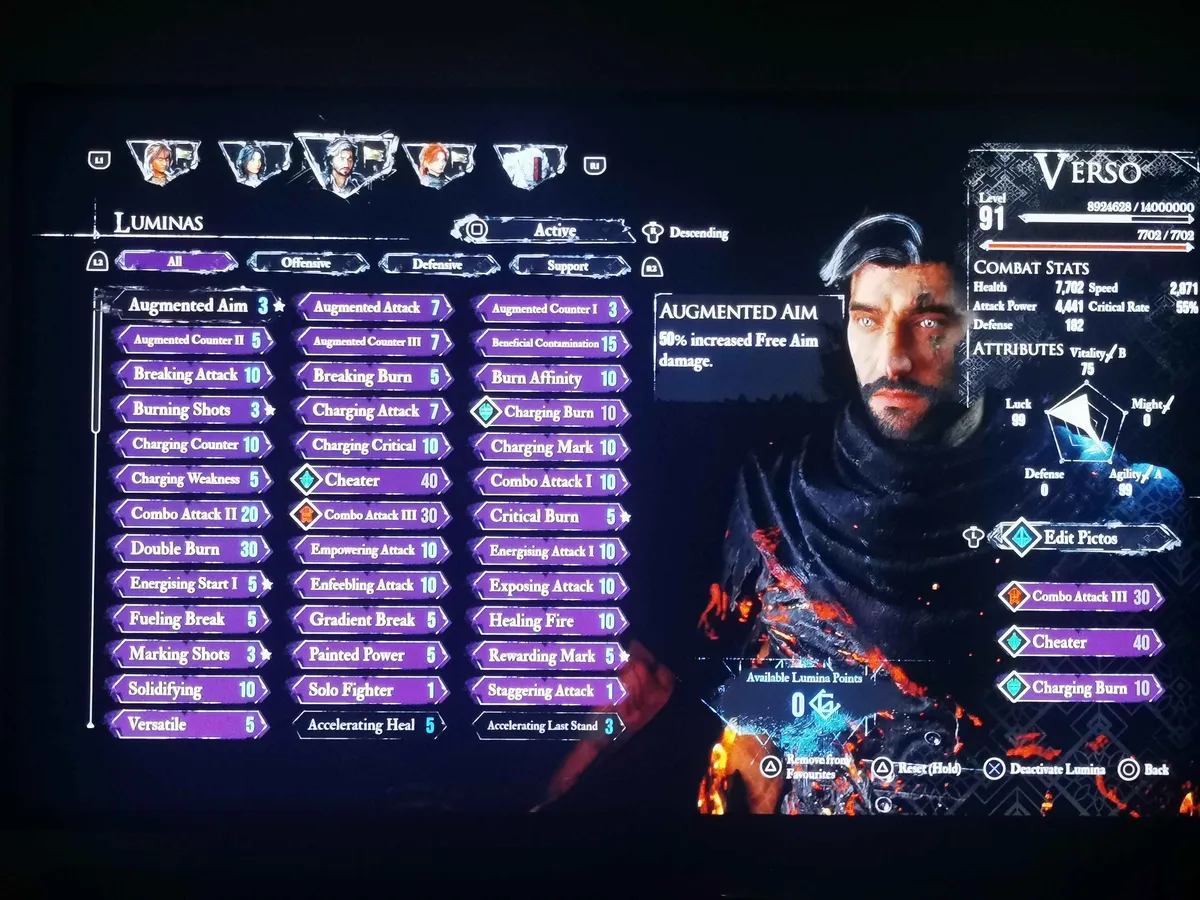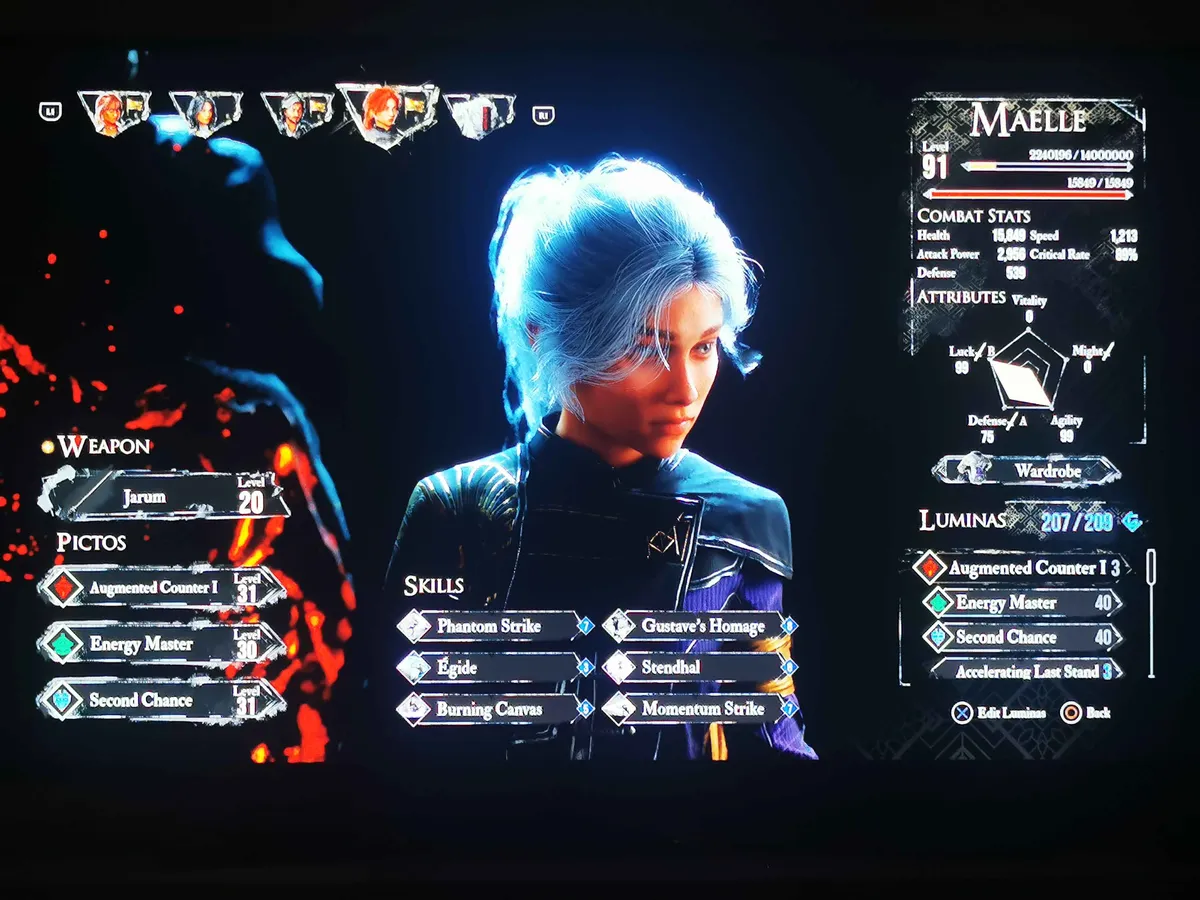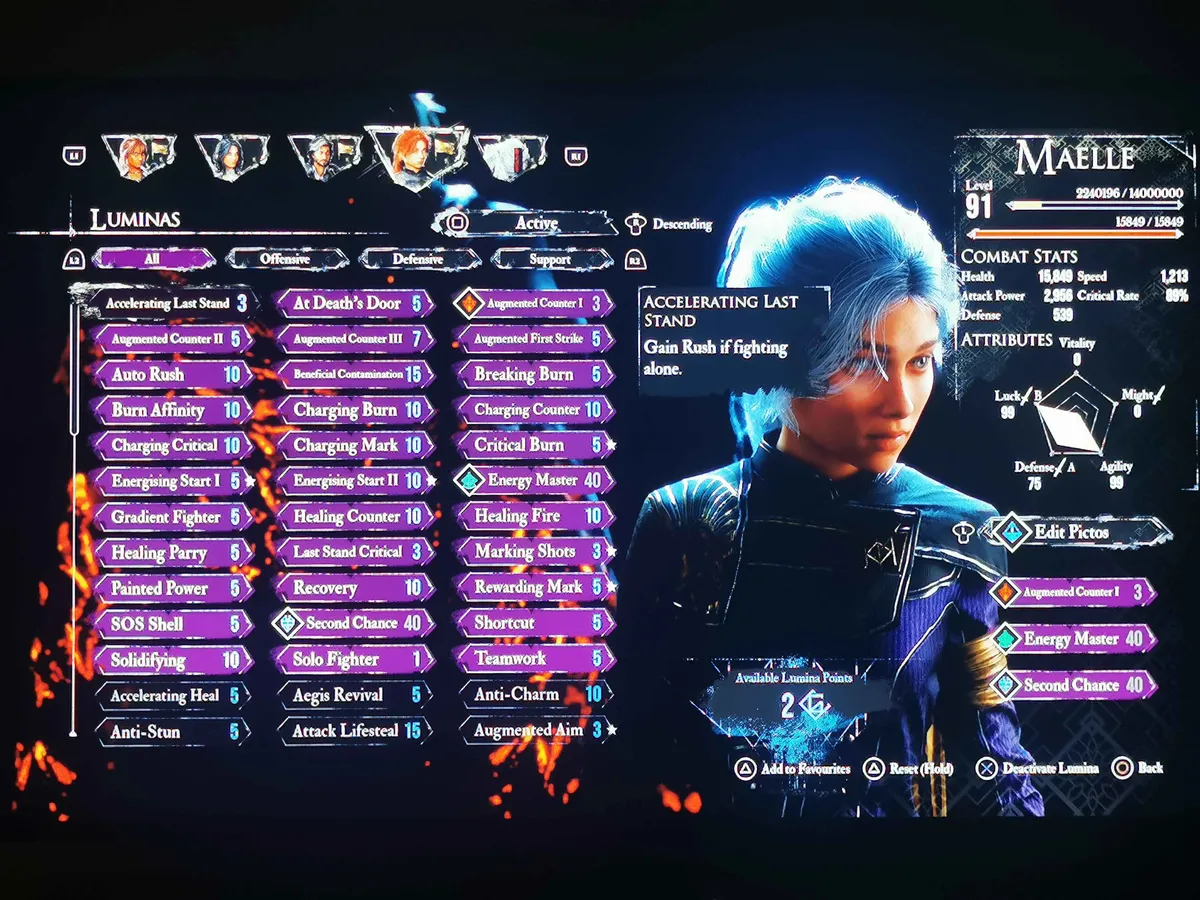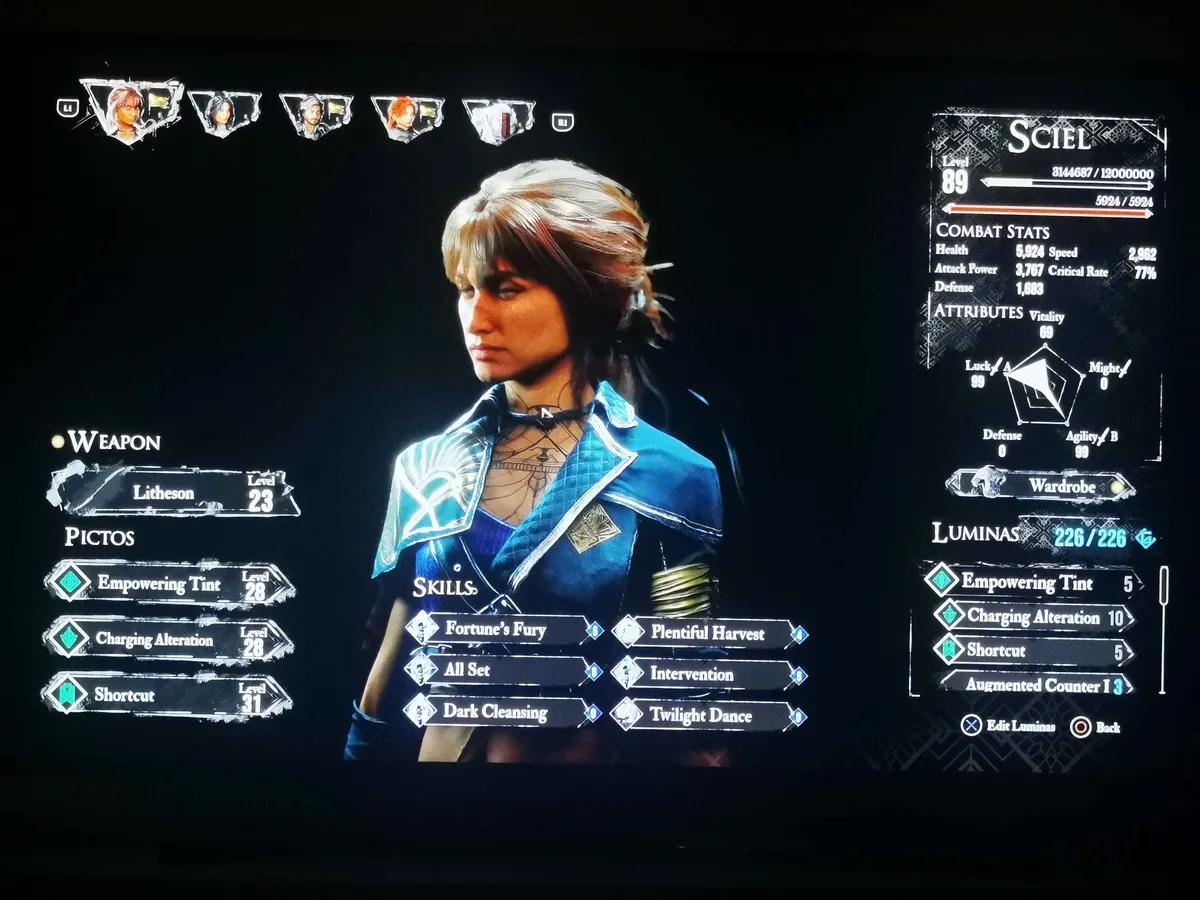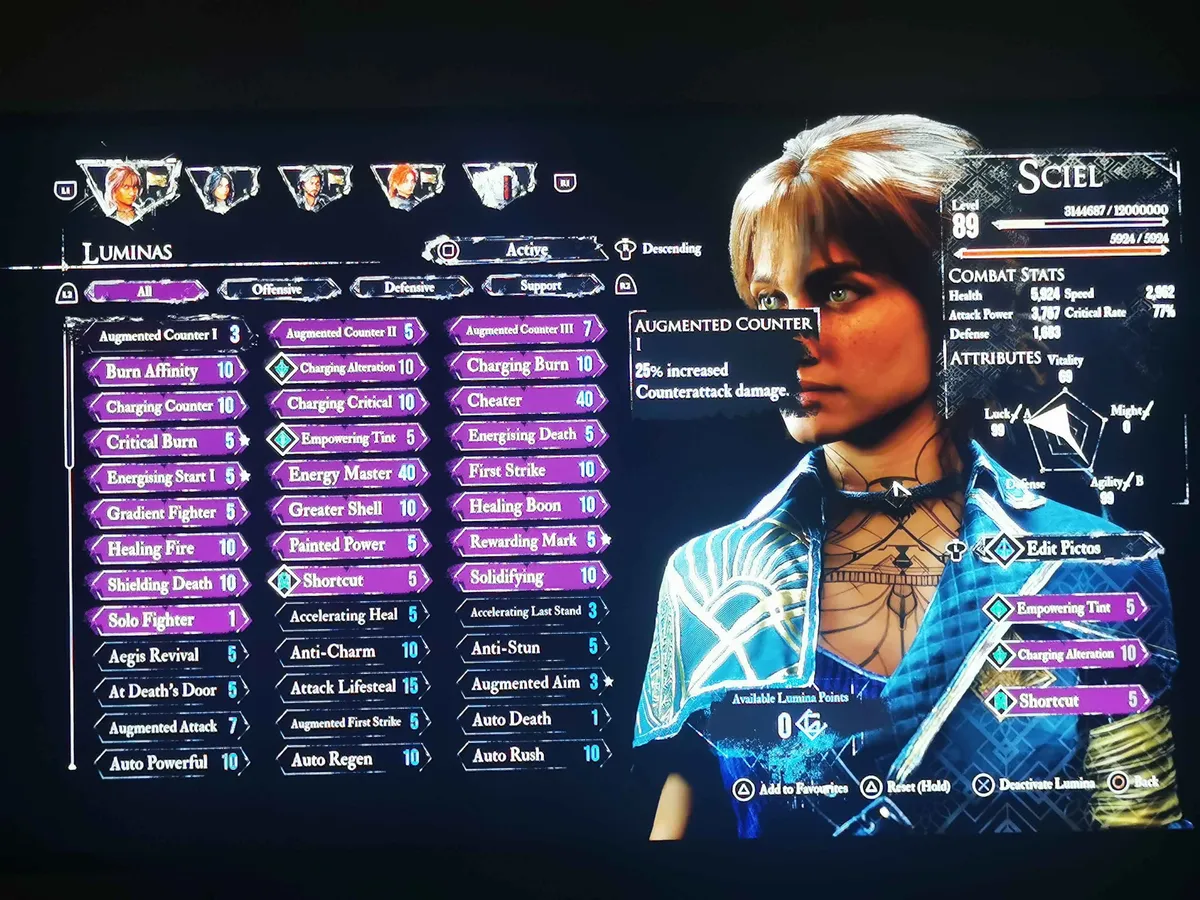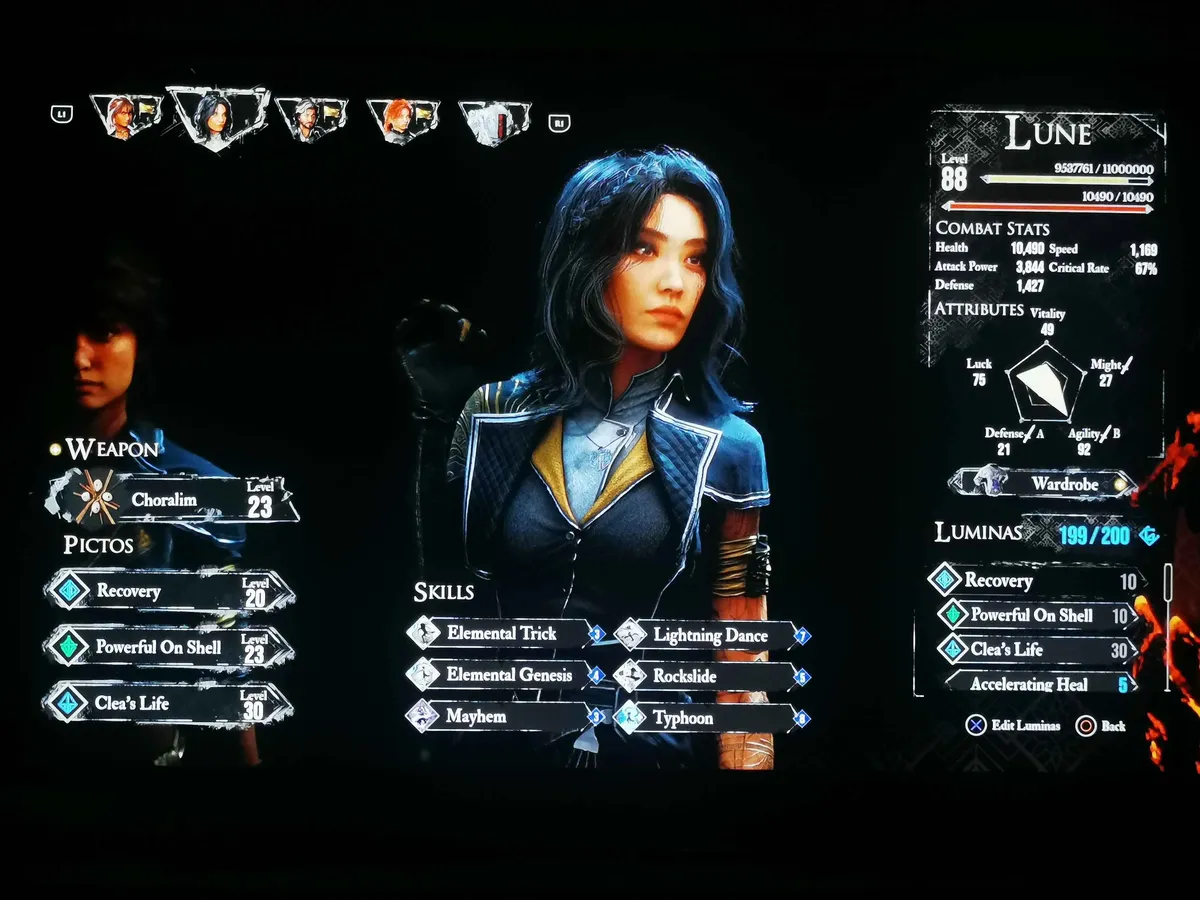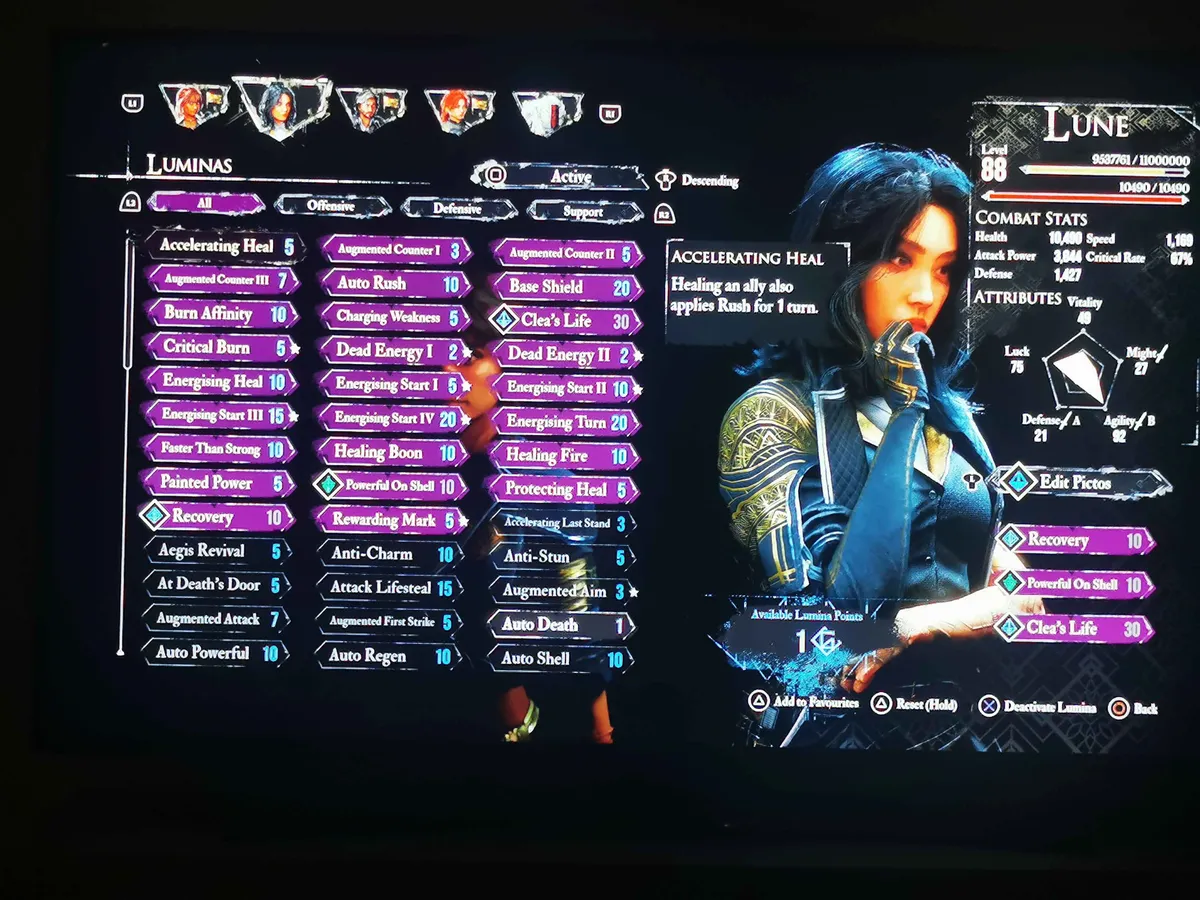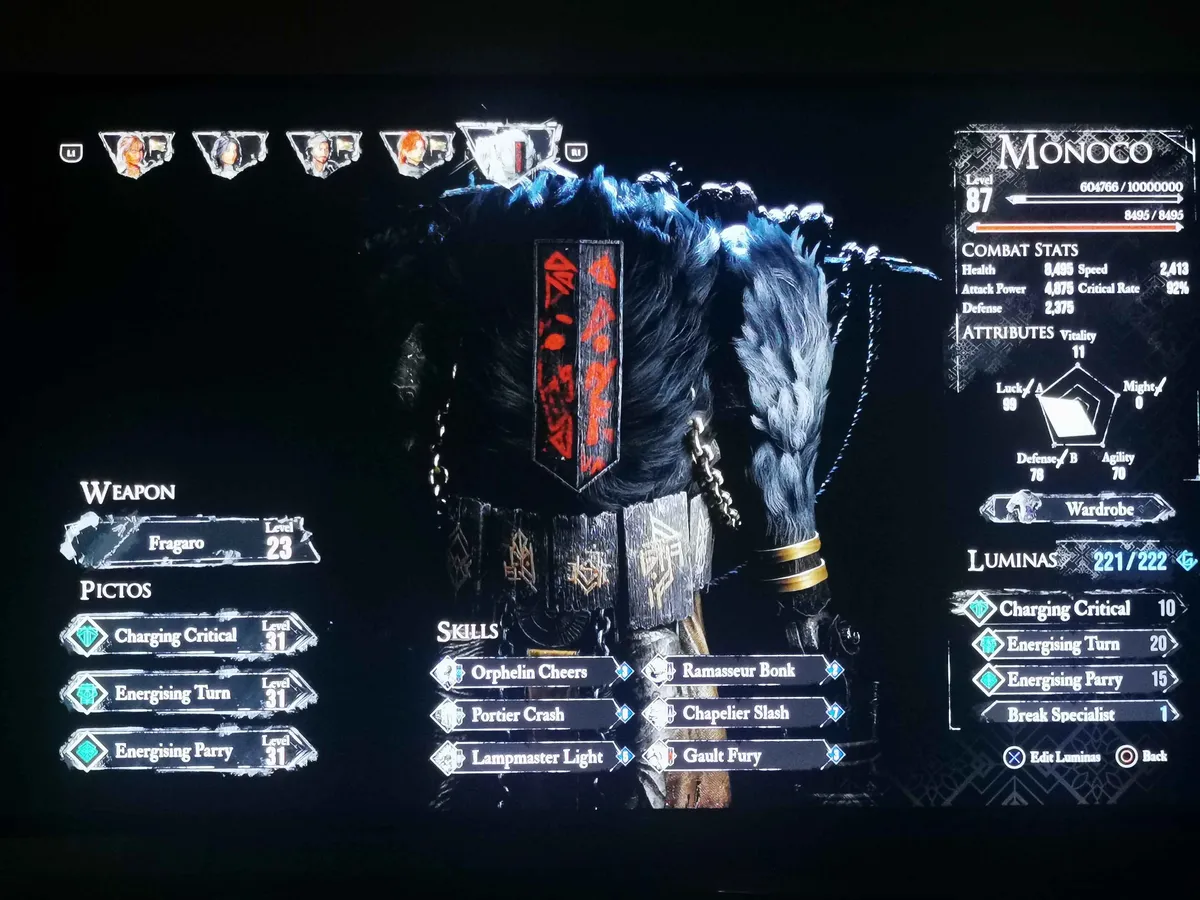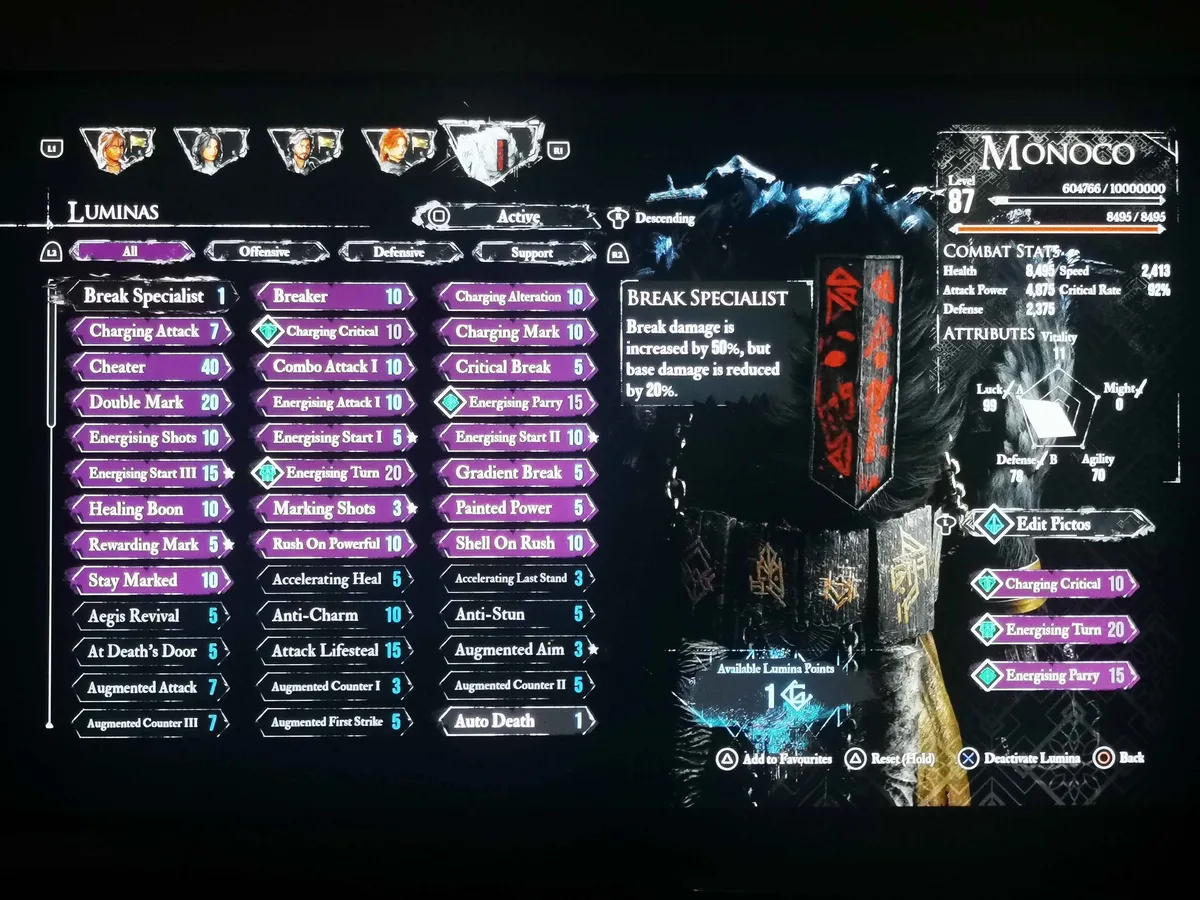[games] Clair Obscur: E33 - JRPGs, contrasts, and the family
2 weeks, 1 day
wow i love clair obscur i wish france was real 💔
(huge spoilers ahead!)
Table of Contents:
1. analysis
talking about JRPGs, my thoughts and criticism on the story, the nuclear family, and character feelings
2. music
talking about the OST and favourite tracks
3. hard mode
going over builds and my thoughts on the gameplay!
this post is a hard mode review, which means i played the game on a harder setting or with some kind of restriction - if you don't know, i really like setting challenges for myself in games. unless i anticipate actually having a bad time with it, i will generally always go for a game's hard setting or otherwise limit myself (e.g. 3 hearts only in Zelda) even on a first-time playthrough. i really like sharing about these accomplishments, so if you'd like, you can browse my #hard_mode tag in the future to see the other kinds of challenge runs i'll talk about!
analysis: JRPGs, and also the family
i'm a lifelong enjoyer of games like Chrono Trigger, Earthbound, Mother 3, Tales of Symphonia, much of Kingdom Hearts, Personas 3 through 5, Metaphor: ReFantazio, Super Mario RPG and Paper Mario... this isn't too far from just being a list of my all-timers. but anyone who's been in gaming circles will tell you that plenty of people bounce off of these sorts of games for their heavy dialogue, long playtimes, and typically slow combat; all of these are perfectly fine reasons to not like something. though, there is an attitude towards this subgenre that can show in how people refer to it:
In an interview with Skill Up, Naoki Yoshida (AKA Yoshi-P)—producer on Final Fantasy 16 and 14—mentioned that Japanese devs weren't keen on the classification [JRPG] when it first cropped up, and even considered it "discriminatory". "It wasn't a compliment to a lot of developers in Japan," recalled Yoshida.
— PC Gamer, "The face of Final Fantasy doesn't like the term JRPG, once considered it 'discriminatory'"
despite the fact that the term is undeniably messy, many westerners continue to use "JRPG" to refer to a certain type of game, regardless of whether it's actually made by a japanese studio. the creator of Clair Obscur as a project even refers to it as a JRPG. it's a bit of a test of how you understand the term and JRPGs as a subgenre. some really do understand it just as "japanese-made RPG", and to be fair any attempt to define a genre of any given thing is at risk of being prescriptive; genres are usually born of a pursuit of common traits, but also historical/political context, technological advances (or limitations) in a given medium, and in reaction to other trends. earlier this year, IGN released a list of their top 25 JRPGs of all time, and i thought this statement was great for pointing at the characteristics common to these games that explain why they draw an IP-agnostic fanbase, irrelevant to the studio's country:
[JRPGs] traditionally put emphasis on epic, emotional, linear stories headlined by handcrafted characters rather than playing generated protagonists. Combat is typically very tactical and often turn-based. And if you're lucky, you'll be able to summon a giant deity or freaky monster to help you out.
— IGN, "The 25 Best JRPGs of All Time"
there's probably more you could say, but to me that truly is the gist of what makes a JRPG and why i like them (as opposed to the likes of Mass Effect or Baldur's Gate). it makes no sense to me to say that a game with these characteristics made in a different part of the world is somehow not a JRPG - the term describes something beyond national origin, something that Clair Obscur does clearly hail from and take inspiration, and something that people who pointedly disparage the subgenre are probably deliberately ignoring. it's a blurry and sometimes loaded line, but i do think at its best, "JRPG" attempts to describe a tradition with a specific approach to storytelling and combat that game creators all over the world, like guillaime broche and sandfall, now place themselves in succession of.
JRPGs had something of a golden era on the SNES and a little bit more on the PS2 and the nintendo DS1, and then from my perspective, things died down a little; it was also during this lull that i fell away from gaming in general due to Broke and some instability in my living situations. when i had the means to start getting back into it in around 2019, Persona 5 had since launched its studio, atlus, into a mainstream recognition in the west that i was very surprised to see when it felt so niche not a few years prior. i would maybe term this a third golden age of JRPGs, with hits from Final Fantasy (though not turn-based), Xenoblade Chronicles 3, and Metaphor: ReFantazio since. maybe it's nerdy but it made me happy and vindicated, seeing a popular resurgence of these games that not only put me onto video games in the first place, but i felt had carried the torch for the medium particularly in the SNES days. these are very heavy shoes to fill as a debut AA studio. at the same time, the veiled attitudes toward so-called JRPGs has grown in response. this made me a little wary, then, of Clair Obscur's unanimous success: how many people were only praising the story because they'd previously written off JRPGs, and so were blown away by standard features that many games before them had already refined to a point? would that mean i was gonna be disappointed?
Clair Obscur starts out strong. the french setting is certainly an adjustment when it comes to typical JRPG fare, but it's fresh. if you had any doubts about whether the writers had chops, dozens of characters die before your eyes in the first 10 minutes of play. even just the music from the title screen is enough to stop you in your tracks. it's just true that on first exposure, you get a sense about as subtle as a brick to the face that this game is going to be different.
exactly how different though depends on who you ask. gene park has said that Clair Obscur isn't "that new" to pre-existing fans of JRPGs; i'm inclined to agree. this is not necessarily to its detriment, to be clear, but it means that the common praise it gets deserves some scrutiny.
first, the story. this is the element of the game which i feel the most opinionated on because it is obviously the driving force of its claim as a JRPG, and it's what gets the most hype. i think the story mostly lives up to it - here's my big criticism: while there's an incredible, and i mean incredible act 3 pay-off, during the build-up, there's not a lot of story beats or character developments that feel super substantial.
Clair Obscur's plot is structured entirely around the revelation that the world you're playing in is actually a fictional creation; maelle (whose real-world name is alicia), renoir, and the paintress (aline) are the only characters who can return to the real world. everyone else, while fully conscious beings, are artificial denizens of a "canvas" - a living painting constructed by maelle's family, made possible by their special "Painting" powers. maelle's family (the dessendre family) has endured a tragedy in the form of a home fire that killed the son, verso, and disabled alicia. the dessendres are shattered into factions: aline (the mom) has taken over this canvas which was co-created by verso and clea (the eldest), using it to nurse her grief. renoir (the dad) essentially wages war against her in the canvas in an effort to bring her back to the real world. clea engages in her own covert methods to try to bring this conflict to an end and reunite the family. verso is dead, but also lives on in the canvas as a painted creation by aline. as the youngest, maelle is literally caught between worlds while also paralyzed by a sense of un-agency. thus, the setting and the story of the game are both the backdrop and the silhouette cast upon it of this family's trauma - given that this is a literal work of art with traces of each member, everything is a metaphor that meticulously reflects back on the characters' beliefs, their relationships with one another, and their role in this grieving process. there's just something so ironic about characters creating their own metatext, a literal semiosis that when broken down, represents fragments of insight into how they work and an opportunity to relate.
as you can see, this revelation blows your whole shit apart. it cracks the game wide open, leaving you to realize that every inch of it is suddenly suggestive of a deeper meaning - part of a deliberate design, not just eye candy or fluff. my main problem is that in order for this twist to have the effect that it does, the game needs you to think that so much is fluff for essentially 2/3rds of the playthrough. the revelation comes after you defeat what (most of) the party believes was the main antagonist, the paintress, and instead of it bringing peace, everyone dies. you are given little information about who she is, why she does what she does (seemingly killing scores of people each year), or why the world is the way it is, and while not a problem in itself, what really makes it frustrating is these gaps are knowingly skirted around by the story with lean pickings to chew on. verso says outright many times that he knows more than he lets on and acts incredibly suspiciously on multiple occasions to confusingly little consequences from the rest of the party.2 there's also no real character development that happens in act 2. the spotlight on maelle is interesting but it doesn't result in anything until The Twist, verso is clearly set in his ways, and sciel and lune don't have much to do other than be react fodder. their social links are often nothingburgers or leave the most interesting parts to a fade-to-black and a text summary.
i think the writers understood that there needed to be some movement here in this key item farming part of the game, but it just felt too forced, too little, and too late. when you go to the axons' (giant golems, essentially) islands to kill them so that you can get to the paintress, while they are actually based on different members of the family, both sciel and lune have microarcs in these areas that feature them, speak to their respective emotional complexes, and give them a chosen one type opportunity to self-actualize and rescue the rest of the party. it's very, very Persona 4/5. on the island with sciel's D-plot (called "visages"), the moment comes out of nowhere and is very mawkish. lune's feels better paced, but it's still just... not enough. neither of these things really result in a change to how the characters act or speak about things afterward. and other than small hints at big revelations to come, nothing else really happens.
the way that sciel and lune get sidelined in service of this larger story is a shame. generally in JRPGs, while a main protagonist may be given greater story importance than the others, there's an effort made to make each character feel still fleshed out through exposition and B- or C-plots. maybe someone asks "hey, you're always wearing this ring, why is that? what's the symbol on it?" or whatever, serving as a little bite of information about this world and the character simultaneously. so it is bizarre the moments that you do get about sciel and lune's backstories are sparse, or buried in the later stages of the cringey campfire social links. especially when, for example, lune has these crazy tattoos/body jewellery and is the only person to not wear shoes... which is never remarked upon. i was completely expecting to hear more about that and maybe the history of some of lumiere's scientific accomplishments studying chroma. of course, it kindof doesn't matter because i'm not interested in that anymore anyway - the third act is what really matters. and that's just kindof it, isn't it? the worldbuilding only matters insofar as it can reflect on the family's dynamic.
the tone of the game also exacerbates how grating this can feel, for me. all of the characters speak in a familiar way with each other, which makes complete sense since they grew up in the same city and are generally strongly bonded given their incredibly oppressive circumstances. but when gustave dies and is replaced by verso, this tone doesn't change, and verso speaks in a similar way to everyone. the result is a YA novel-ish conversation style at times, especially in the campfire scenes. these are scenes that my girlfriend delicately called "clearly inspired by Baldur's Gate 3" (my mind went to Persona), where you go through a social link with each of the characters and earn new powerful skills in return. these were... not my favourite. the segments with esquie, monoco, and maelle are usually alright, because verso has a pre-existing relationship with them. sciel and lune have no such relationship; evidently the tone can't adapt to this reality, so their conversations often take on a tortured banter based around "getting to know each other" while riffing about being too traumatized to easily do so. (monoco's scenes can feel this way too imo, because him and verso have a very brotherly faux-antagonistic type relationship.) this kindof overly familiar demeanor feels unearned when the game has been teasing a huge pay-off for what feels like a couple dozen hours, instead of dedicating the necessary work to the characters' relationships themselves to make the banter feel natural.
the thing is: JRPGs are famously very character-focused. given that the game takes clear inspiration from probably about a dozen other video games in various aspects, it seems pretty clear to me that the storytelling structure was inspired by fromsoft soulslikes, especially Elden Ring and Bloodborne. both Elden Ring and Bloodborne have a kindof backwards plot - by the time the player comes around, all the grand events have already happened. you are merely a rat birthed in the debris, left to pick up the cryptic pieces and try to fit together a broken poem of them that can maybe divine what the writers' intent even was regarding what the world is and what took place. in fact, much like Elden Ring, the larger shell behind the canvas of Clair Obscur was written first3; the actual progression of the plot was established later. the difference is that Elden Ring slow-drips the discovery to you through piecemeal item descriptions and NPC dialogue, so the knowledge-gathering is completely within your control - it rhymes with the open-world nature of the game. Clair Obscur by contrast is a linear JRPG, with a party of characters who make the plot legible to you by reacting to it and facing its challenges, where the true discovery and meaning-making are tightly controlled for the first two-thirds of the game. it makes for a more explosive analytical process than Elden Ring, but it also means that after the first act, there's little for the party to be curious about or reflect on. they actively avoid it with verso!
there are other questionable story and tonal nitpicks i have - like the culture of the gestrals being that they just want to fight 24/7. it just feels kinda silly in a low-effort way? i could say that about the sense of humour in this game in general, i think. there's a number of cutscenes (like many with monoco, such as meeting him the first time where him and verso go "Good. Okay. Good. Good. Okay" or something back and forth a dozen times) where there's a joke attempted by the writers that just does not land. irreverent humour is tough - it's been famously overdone across every medium for like, 15 years. there was a time when it was fresher though, such as in Earthbound, which to the best of my knowledge singlehandedly created a precedent for that tongue-in-cheek, socially-critical tone of humour in video games. the thing about games like Earthbound is that the humour, while being irreverent, was also smart and thoughtful. Earthbound, as a JRPG set in contemporary "Eagleland" in a sea of 1990's Final Fantasies and Dragon Quests, is parodying something very specific - attempting to j. j. abrams the expectations of the player. being irreverent without a clear idea of what it is you're subverting feels like you're being childish instead of doing the harder, but more interesting thing: doing something interesting.
i did think the gestrals could still be funny, and found them endearing at times (there's a scene with noco that made me laugh so hard i started crying). and i do understand that there's an in-universe reason for why they're kindof childish. but maybe that's why i feel an arm's distance from the game no matter which way i slice it. this is a debut game from this studio, an impossible passion project that should not have turned out this good - so despite the fact that it is this good, you can't escape that it is a "first" game. in Clair Obscur, i see the echoes of other RPGs that while all composed together in a surprisingly capable way, i can't help but pick out the notes that feel a little discordant because there's a skewed execution compared to why they worked so well in their original contexts.
i still strongly, strongly recommend playing this game to literally everyone. i only say all of this because, contrary to a lot of the broader sentiment i see, there's a vague sense of "hmm... i dunno" towards Clair Obscur from people i'm friends with who are already fans of various RPGs, especially JRPGs. the aspects that come across as amateur compared to more established teams' works means that it's at risk of losing people in the first 2 acts who get the impression that it's just overhyped by people who have never played a game with a substantial story before. especially when Clair Obscur is a game that is comparably light on dialogue for a JRPG, something that it earns praise for and that is a sore point for many who are turned off from the likes of Tales of or Final Fantasy. the attitude that a lot of RPG-enjoyers have towards this reaction, i think, is honestly that it's usually a skill issue rather than a flaw of the games themselves. it's something that i, at least, have accepted comes with the territory of creating a hyper-detailed story campaign. i think Clair Obscur does an amazing job with the facial animations and voice acting to make the stakes feel real. it's still very palpable. there is a cost however to not having a dialogue- or flavour text-heavy game, and it's that there's less time to get to know the characters and how they act and speak. that's why dialogue and flavour text are so important, even if it's not everyone's cup of tea. so when you're in the lull of the second act, you get the impression that maybe people just like this game because it's an interesting RPG with light, at-times generic dialogue. i had a bit of that sinking feeling, myself. i pushed through because act 1 was good, and i knew the praise had to be coming from somewhere. i'm very glad i did - but i have friends who did give up on it or weren't as wowed as a result.
and to abandon the game early is a huge shame, because the depth of the family dynamics and the way they are portrayed is staggering. even after the big revelation i didn't want to go too wild at first insisting there were deeper meanings everywhere, but they really did weave so many metaphorical details into the worldbuilding. you can't help but feel a little crazy putting things together. for instance, the gestral river is a mechanism by which gestrals can be reborn, but always come back different. the kicker is, when you understand that the canvas was mostly painted by verso, and you find out monoco and noco were names of dogs that the dessendres owned, you realize that the gestral river was actually a metaphor verso crafted as a child to represent his feelings about pets - how you lose one and then your parents get another that may feel similar, but is still painfully different. you also understand that verso's statement about monoco being his oldest friend is not just about the painted monoco you meet. crazy storywriting.4 the axons are another blatant example, since they were all created by renoir to caricature the different members of the family: visages (verso), sirene (aline), the reacher (maelle), and the hauler (clea). a surface reading of the game would take these representations of them to be actually suggestive of their character - but since they are representations created by another character, they imply just as much about renoir's relationships with them and his expectations of his family. sirene, a bewitching dancer who charms the party with illusions of lost loved ones, is a kindof contemptuous depiction of his wife as a grieving manipulator. the reacher similarly reveals how while he wants his daughter to actualize her potential, in the end, her axon is still a motionless (as if dead) humanoid with a broken face. it's hard to see renoir as a neutral, let alone compassionate actor when the axons are so caricaturized - and i hope that was intentional.5
the nuclear family is a very complex and frightening thing. even absent any outright toxicity or abuse, nearly everyone who grows up this way has some kindof opinion about the way they were raised, or how a sibling was favoured over them (let alone having mean streaks and a deadly fire in the mix).
like, clea is one of the most interesting characters in the game to me. her absence says just as much as her sparse appearances: she conducts herself literally behind the scenes, viewing herself as above the skirmishes in the canvas. she seems resentful of the parents and of maelle. if you want to find out more about her, you have to look backwards, to before you learn of her existence: various fading NPCs and colourless nevrons (special, all-white versions of the game's monsters who you can talk with) refer to her as "a Paintress" who makes nevrons. seeing as this is verso's canvas that clea also worked in when they were close, this is probably something she did playfully for a long time, repurposed as a war tactic in the Dessendre Conflict. it's also literally occurring to me just now that the colourless nevrons may be discarded works-in-progress by clea herself because she was unsatisfied with them - i'm pretty sure they tend to talk about perfection or longing for her guidance, in the same way that clea is known to be obsessed with perfection - so they become collateral damage of her own struggles and therefore, a cross-section of them, a blade that does not discriminate whether it's herself or her nevrons or her family she's cutting down. do you see how crazy it is when the writers care so much about making every detail of the game meaningful, and challenge you to engage intellectually with it?
another thing about clea: there's a location called Painting Workshop, where you see a sculpting studio and a fading boy NPC (a fragment of verso). he speaks of a woman who wove her spite into the canvas, "birthing a horror to plague [his] nights", but you can "dissolve the nightmare" for him. this area contains an unlockable superboss, a lampmaster - a boss that you first encounter at the end of act 1. so it would seem that clea purpose-built the lampmaster to torture verso. another fading boy near the first lampmaster encounter says that this is unlike clea, that they used to be best friends, but she changed at some point after outgrowing verso (and the canvas or maelle?). so just as there's sympathy to discover for clea, there is also quite a wretched side of her that reveals itself depending on what you pay attention to. in this way, the game is a chiaroscuro portrait of each character - a balance of light and dark, never purely one or the other. while i'm a firm denier of things like mutual abuse or "both-sidesing", abusive tendencies can evolve from an unfair circumstance or unresolved trauma, and nowhere is this seen more obviously than the nuclear family (the mom as domestic slave, the kids as an underclass with legal disadvantages, often with daughters enduring more criticism and taking on invisibilized responsibilities such as childrearing - to say nothing of any intergenerational trauma and how nuclear families are expected to operate alone). and you can follow this thread even further - her perfectionism likely factors into her animosity for maelle and perhaps for verso, as well. verso talks at one point about stepping outside the visual artist family mould to become a musician, which was frowned upon. it wouldn't surprise me if, as an eldest daughter obsessed with performing to the expectations she's been given, this infuriated clea, and perhaps she created the lampmaster (maybe the nevrons at all?) to drive verso out of the canvas to keep him in line. it takes a delicate view to depict a horrible situation with multiple actors, honestly show the pain they have caused each other, and not excuse or whitewash it while also showing what led to that outcome. nuclear families are often a mishmash of exactly this; subpar circumstances reacting to subpar circumstances, cascading down and causing a pyramid of hurt that spares no one, even while still being asymmetrical.
there's a commitment to chiaroscuro, Clair Obscur, delicate balances between contrasts - dramatically, metaphorically, morally, even musically. several songs deal in these contrasts (in "Maelle", contrasting maelle and verso; in various battle themes, aline and verso attempting to reach each other), with one in particular "Aux Lendemains non Écrits", the credits music for verso's ending, going so far as to just describe how chiaroscuro is used as a metaphor for the story in a very literal way. it manifests itself in all aspects of the game; jacob geller even hints in his video about Clair Obscur that eclipses/black holes are a way that grief is visualized in the game's semiotic repertoire as well, a yawning nothingness that bends logic itself, and what are black holes if not another kind of contrast? as much as i complained about the tone of the game earlier, i agree with something skill up says in his Clair Obscur video, that there's a very palpable sensitivity to how characters are depicted which lends such a depth to this contrasting approach. it's beautiful, and it's something that i do wish more narrative games, including JRPGs, had - a dedication to a thoughtful, artful literary framework that reflects itself in visual metaphor and in the characters.
when it comes to maelle, i think this approach falls short, and it's probably the aspect of the game i have the most complicated feelings about.
at the end of the story, maelle and verso come to blows over the fate of the canvas, and you are given a choice of whose will to enact. so, there are two endings depending on who wins. i think it's pretty clear that the "good" ending in the eyes of the writers is verso's choice to erase the canvas. maelle's ending is tense and unsettling, depicted purely in grayscale much like her traumatic visions, scored by discordant music, her face partially fragmenting into petals. by contrast, verso's is longer, more characters make an appearance and have their loose ends tied, and maelle seems at peace after all is said and done despite her initial resistance - but this happens off-screen without any of her direct input. in both endings, maelle gets very little resolution. this feels so frustrating after she emerged as the main character halfway through the story and her motivations are solely shown as sympathetic up until the end, especially when her living family seems neglectful or outright cruel to her. it feels like the story is setting up her final self-actualization as being synonymous with a fight to save the canvas, and then basically in the last sequences of the game, verso's concerns are finally allowed to have plot implications that supercede those of his sister's journey. i'll be clear and say that i don't think the writers had to make maelle's views the "correct" ones, or that this switch in focus shouldn't have happened at all. i actually don't think that the canvas should've been preserved given the circumstances. i think verso deserves to have his will honoured, that he wants to be allowed to rest as his family's fighting prolongs his pain. but it was done in a way incongruent with how maelle's journey is depicted in the rest of the story, such that it feels like she's being rug-pulled - that she wasn't allowed to learn anything of her own volition. in the end, verso had to show her the way by literally killing her, ripping away the only thing that had ever given her comfort, leaving her to come to terms with it out of the eyes of the audience. this feels very cruel for a character that seems like the traumatized black sheep of her family, especially a youngest girl. where aline and renoir are equals engaged in a fight, and clea is a troubled eldest daughter who has wreaked her own havoc on the younger siblings, maelle is... a reclusive teenager. she seems to get the most outright animosity. i don't know what the "other" side, the obscur to her clair, is meant to be. in their voice memos, renoir and aline say that she refuses to move on and that being around her is painful, respectively; but like she points out before she fights verso, her real life is lonely. her parents are trapped in a fantasy. clea actively scorns her. she was disfigured and disabled by the fire and has no resources to cope with this change. she has every right to actualize herself however feels right to her - so why is it inevitable that she would make the same choice her mother did, to lose herself in the canvas, and therefore she deserves to be robbed of the chance to get her own closure?
what's even more confusing to me about this is that clea herself says as much - after the endless tower, the fading woman (a clea fragment) has a bit of a heart-to-heart with maelle. she criticizes both of the parents, saying "it's not selfish to make your own choices, sister". she even gifts her a hairstyle stating that it's a "reminder that you control your own life" - and it's maelle's default haircut, but coloured silver like alicia; a true synthesis of her constructed identity in the canvas and her given one in the real world. this, too, seems like it would've led perfectly into an endgame where maelle's arc concludes with her taking charge of her destiny.6
her actually doing this has sinister results, the writers decide, and that's why verso needs to have a battle of wills with her and force her back into reality.
to use the game's visual language, her "obscur" counterbalance is a future action that the writers decided made sense for her character when she gets a taste of self-actualization. i completely get that keeping the canvas alive would torture verso. but why does maelle have to emptily repeat the mistakes her mother made when she showed none of this inclination before, other than being kindof a bookworm? it's almost as if she becomes an antagonist at the last second. to me, it's a cynical decision on the part of the writers because it seemed like a worthy sacrifice in service of having maelle and verso be foils to each other, to give voices to the two "arguments" of the grief-escapism-coping question that the game presents, and to buttress the chiaroscuro motif. it leaves unresolved the themes of her character arc to that point, which is like, The expectation in a character-focused, linearly-progressed game such as a JRPG. resolving arcs! i ask the writers this - why does an abused girl have to make the unhealthy choice? why doesn't she grow at all from freeing alicia, from talking to clea's fragment, from fighting renoir and aline (as the paintress)? it's a cop-out, to have that rhetorical tension which started with renoir and aline - reality or escapism, intervene or let be? - only be given explicit words between the siblings at the very end, leaving the resolution "loose" because they want the audience to answer, and then not even doing that much as they allow a bit of editorializing to sway which ending results in the healthiest outcome for the family. we don't actually get a chance to make our own answer. and why should we? i'm not becoming elden lord in a lore sandbox. it should've been maelle, because she is the most important character as stated by the story focus and in some ways, the mechanics of the game itself. working in equal balance of light and dark is great, but it falls apart when you have to come down on one in favour of the other and you're not prepared to do it strongly. you only flatten the shades that way.
i do think verso ultimately acts out of kindness for maelle, which shows in how he speaks to her as she disappears from the painting ("it's gonna be ok... you have this incredible power to paint. you'll never have to suffer a life you don't want"). i'm not as upset with what we got as i could've been otherwise. maybe if they had committed to his ending being the only one, they could've focused on fleshing it out and sticking the landing for both characters more gracefully.
in a way, Clair Obscur is a canvas for you to paint a chiaroscuro picture of your own feelings about it - you're led to feel one way, before being shown a nuance that sheds light or casts a shadow onto their form. the paintress of course, initially thought to be a genocider, is instead revealed to be defending the people of the canvas from renoir's onslaught. renoir is maybe the closest to being irredeemable as a stone-cold killer who is unafraid of further traumatizing maelle, but he does have his more vulnerable moments; his fading man fragments in renoir's drafts pontificate on losing yourself to your work, and people's hidden natures and being shocked at how someone you loved could behave a certain way.7 clea manages to come off absolutely demonic and also incredibly reasonable, even kind, at different times. even verso, who seems largely innocent, has a complicated side shown in the julie story. and maelle, whose contrasting features i wish were more thoughtfully defined. my own feelings on this story are much the same - strokes of light against dark, contradictory and unresolved.
miscellaneous thoughts:
- i love sciel so much. of the spotlighting that the lumiere girls do get, i think her backstory and the person she's become as a result is so powerful. she's just really cool and her compassion for verso really touches me. in the ending scene as she's gommaging, she's not even mad that he chose to destroy the canvas... she just walks up to him with such understanding in her eyes. it totally guts me.
- lune is not as interesting to me and i think her romance with verso is... so weirdly forced. but similarly her aura in that ending is fucking crazy. she just sits down cross-legged, glaring daggers at verso. she doesn't say a damn thing, she knows that he knows exactly what's going through her mind, she doesn't need to take it out by yelling or attacking or anything like that. love that so much
- minor complaint: another thing that undermines the dialogue and that makes Clair Obscur seem more amateur, i think, is that the subtitles are frequently bizarre. exclamation points and question marks will be doubled or tripled up, and a lot of text is written with all caps or has periods in inappropriate places that don't match the cadence of how it's being voiced. odd and irritating detail
- as an artist, i do need to take a second to say the visual style is awesome. the nevron designs are sick, they clearly have a fresh inspiration (discussed in the skill up video). the environmental design is so dazzling too - the way that you can see the texture of the oily brushstrokes in so many places... it's nuts to me how they were able to make the diegetic method of creation for the creatures and places so tangible in their design. like, the nevrons look like stop-motion sculpted characters and this was even something i remarked on a few times before the act 3 reveal. nothing quite "places" me in the world in the way that say, Tears of the Kingdom does, but it's still pretty good i think
- at the end of maelle's social link, verso and maelle talk about the monolith looking empty, so they agree to paint something on it. and me and my girlfriend were like, no way they actually changed it. how many games say some change like that has happened for flavour and then you're kinda meant to just imagine it because why would they actually draw/model/program that? and upon rushing back to the overworld we could not believe our eyes. they actually wrote "papa va t'en" on the monolith. we laughed so hard, it was so incredibly charming. it's bittersweet (because it stirs my mixed feelings about the ending again, i'm sorry) that what used to be an object of literal separation between their mother and father, by the end of the game becomes something that bonds brother and sister, a doomsday clock appropriated as a light-hearted solidarity against renoir.
music: you actually cannot be for real
need a separate section to talk about the OST this time because obviously the music in this game fucking bangs, everyone knows it, whatever. what i find really sweet is the story of how lorien testard (the composer) was found for the project and his inspiration for getting into composing in the first place - he essentially just loved video game music so much that he taught himself guitar and made fan compositions for video game trailers that he liked (discussed in the skill up video here). this especially is so endearing to me because i've loved video game music specifically as a distinct tradition of musicmaking ever since i was a kid. the way tracks are handcrafted for the contours of a given emotional storybeat or a location/scenario, and also have the additional challenges of technical limitations and (usually) needing to be continuously listenable for an undefined period of time, gives rise to different emphases in their composition that really appeal to me. seeing someone pursue that same appreciation, teaching themselves the fundamentals of This kind of music to great success is just so cool. you can absolutely hear his love for VGM in the way lorien nails the emotional setpieces all over the game, especially the big boss battles!
by far my favourite thing about the OST is how varied and rich the battle music is. this goes above and beyond what most RPGs do and it's something i really hope inspires broader change, because even with the increased variety we have gotten from series like Pokemon and Persona with better budgets and technology, there's still typically only the one default battle theme and hearing that over and over again gets so incredibly exhausting. just have multiple! Clair Obscur did it so no one has an excuse anymore!
favourite tracks:
- Rain from the Ground
yes ok i know. but i don't think you understand: up to this point my girlfriend and i were like "alright the music in this game is nice", so getting to the goblu fight and hearing the intro was like, huh, ok, cool. and then the drop kicks in and we actually stared jaws dropped at each other. That was the moment that i understood what we were dealing with. it's not Quite EDM but it has those sensibilities, used in a way that i've never really heard them be used before, and it just really stunned us both as EDM enjoyers to hear the composer be willing to pull something like That out in an OST like This. - We Lost
the violin/whatever is just so awesome, and the way it keeps upping the ante as the harder surprise stages reveal themselves. i can't help it... the Ultimate Superboss Song. and of course, it slaps your ass, clean off. lorien made sure of that - Une vie a t'aimer
brushing up on my mandatory canadian french classes from childhood just to learn how to sing the different parts of this song. hearing the scream-singing come in in each iteration of this theme is definitely another "my girlfriend and i stared at the screen for a solid minute before doing anything in-game" moment. lorien knew exactly what to do to really capture the emotions of each setpiece - he wasn't at all afraid to just go for it even if it might not be congruent with the rest of the soundtrack, and i'm very glad for that! - Une vie a rever
in particular i really like the part that plays during the fight with alicia, the punchy drums and the marching snares are awesome, but i also love the lyrics. it shows that there was an intent with maelle/alicia that, even though it was provincialized to the optional reacher area and doesn't otherwise reflect in the actual events of the story, i can appreciate that this possibility for her character was at least explored in-game. - Our Drafts Collide
okay this one is surprising me. i totally slept on this one until giving the OST one last listen before publishing this. i forgot that an instrumental version of this plays during the tutorial with maelle - and by the way this is also the song that plays during the ending verso-maelle fight? are you fucking kidding me sandfall?? - Our Painted Hatred
this song really fascinates me because it sounds orchestral and grand yet very hopeless, as if you're fighting something you have no chance against, which feels uncharacteristic for the fight music; the title also sticks out, and it only plays during this one optional boss called The Scavenger (!) in an optional area. i can't figure out what the story relevance of the boss is beyond that it must have something to do with verso and clea given the area that it's in, and that its name follows the conventions of the axons. - Dualliste
it's just sick (and so is the boss). all there is to it! - Aria pour un Masque de Couleur
this song is one of just three in the soundtrack to be written in english, and as a battle theme being only vocals and a couple instruments it's just... so striking. it's so mournful and so desperate, taking the perspective of maelle yearning for the stars and missing verso, with a backing organ that gives it almost a religious tone as if she's trying to repent for a sin. this one being the one to be named for the couleur/anger mask is significant too i think - it captures an edge of maelle's struggle that i think a lot of ex-young struggling girls feel; scorn for the world and for themselves, all at once. felt this one - Goblu
the title pisses me off because it confused me when first trying to find "rain from the ground" in the soundtrack, but obviously this one is beautiful and so unique for a battle track. and you just gotta go "amamasamamabana... yeahyeaaaah" during that One Part - Aria pour un Masque de Joie
the way that this song is so unsettling and somber despite being named after joy... it's like, tonal irony. the lack of lyrics and the conflicting whimsy and melancholy make me feel like i'm trying to grasp at something that can't be grasped - really love this song - Until Next Life
i mean, come on - Lampmaster
i have a soft spot for this one especially because this boss is the first wall of the game and it's much more unsettling than anything you've seen up to that point, which the music really helps establish the gravity of. it becomes a notorious returning bastard as well so it's an iconic song to me. hate and love this boss
hard mode: gameplay & builds
the actual gameplay and mechanical progression throughout the campaign is like, the best thing about Clair Obscur. my girlfriend and i swapped the controller at different times, but i took over most of the playing and buildcrafting at the very end. i of course played expert - the only difference in expert mode is that enemies deal twice as much damage, which definitely isn't nothing, but parries and dodges do have the same timing. overall i think choosing expert was right for me since the reduced damage in normal would probably have made things feel too easy; i loved the difficulty. we definitely didn't breeze through most bosses unless we were overlevelled or very used to fighting them. we tended to die at least 2-3 times, sometimes around 10 on the harder ones.
some miscellaneous things i liked about the combat/buildcrafting:
- i liked the soulsborne element of replenishing upgradeable heals (and revives!) at checkpoints, rather than managing gathering/buying consumables
- no random encounters
- getting creative with extra actions that don't consume a turn was cool, like free aiming and gradient moves. taking the Persona 5 gun mechanic and fleshing it out + making it a viable attack strategy unto itself was awesome
- obviously each character having their own Thing is crazy
- the options that get opened to you in act 3 and the way they built around that is really, really neat and fits well thematically with maelle discovering her true power as a paintress. skill up talks about it more in his Clair Obscur video with the lead game designer, who actually took this philosophy from RTS and ARPGs!
some things i didn't like or had issues with:
- the UI of the menu, particularly getting to the lumina vs. the pictos, is so unintuitive, mostly because where you can or can't navigate isn't very apparent due to how menu items are visually placed relative to each other
- um... not really anything else, i guess?
of course, all the boss fights in the game had absolutely crazy aura. every fight with renoir, the paintress, so many of the optional boss fights like clea, and of course it goes without saying, simon. my girlfriend i think hadn't experienced this trait to this degree in a game before that is so emblematic of JRPGs, the ability to coalesce all the tension and story threads and meaning of the game around a single boss fight that feels like the most important moment of your entire life, so she went absolutely nuts for lots of the story fights - especially watching me do the simon fight. not only is simon like, difficult and very interesting lore-wise, he is a master class in how to subvert the mechanics of your game to make for an insane emotional setpiece. yes, there's a phase 2 with a new health bar and a new song with double-time combos, but there's also a phase 3, and the way it's introduced is simon erases the current party from the canvas. first of all: holy fuck. second of all: the fact that he has the power to just... do that, despite being a denizen of the canvas? what other painted creation can do that?? and thirdly you realize this means you cannot allow your party to die in this encounter, unlike every other fight in the game. you Have to use your backup team for this moment, so you need to teambuild twice and you also realize you should be good enough to do the first 2/3rds of the fight with just two characters because you're gonna struggle a lot against this final phase if you don't have a full 3-person party to help you juggle turns. especially because simon's combos are now triple-time. uhh, yeah. THAT just happened!
so! by the time we fought simon, here is what our configuration was:
- Verso: Special Baby Boy Free-Aiming Burnmaxxing build. using corpeso + double burn plus lumina/pictos that gave him more turns, added more base attack hits, built gradient charge like crazy, and that farmed status on his free aim shots meant that verso was a fucking powerhouse, almost never ran out of AP, and could hit S-tier in 2 turns while amassing like 100+ burn. i also loved having end bringer and leadership along with his extra turns, so i could sometimes sacrifice his S-rank to get the stun re-application on broken enemies from using end bringer at A-rank instead. he was my favourite character to play, so fun and rewarding, and i'd always choose him to solo when prompted. [slaps the top of his head] this bad boy can fit so many lumina points
- Sciel: Litheson Cheating End Slice build. i was so confused on how to use sciel for literally the entire game, which is a shame because her attack animations are so hype for literally no reason. she's a huge AP suck and i just didn't get it. when i gave her litheson, energy master, and cheater though, i finally understood her; she became completely pivotal to the simon fight. she almost always had maxxed out AP. i also liked using all set, intervention, and plentiful harvest, to help manage turn order, re-buff party members on awkward turns and have an alternate way of consuming foresight. i had a lumina on her as well that passively healed everyone when applying a buff.
- Maelle: Jarum + Gommage girlie? maelle was (maybe blissfully) easier to buildcraft especially after getting jarum, since switching to virtuose stance was simplified and we could just focus on using more powerful attacks. we pretty much just spammed gommage/stendhal/burning canvas with her. i did like my strategy of building her with health- and defense-heavy pictos so i could use egide to farm parries and counterattacks with her (for switching to virtuose) and hopefully tank any hits that i missed.
- Lune: Pretty Much Just Elemental Genesis. we used her for most of the game before we understood sciel better - we liked trebuchim for the free aim stains, and mostly spammed lightning dance when we got the chance. we finally landed on using choralim + elemental trick and then elemental genesis. since enemies were basically always burning from verso, her crit chances were usually 100% with critical burn, which also guaranteed 4 stains from elemental trick and then being able to get a genesis off
- Monoco: i'm so sorry monoco i just didn't get you buddy. my girlfriend really ended up falling for him and gave him a break damage build, but i just uhhh yeah. did not like the bestial wheel
here are pictures of our final builds if you'd like to see the exact lumina and skills we had on everyone:
the simon fight: the strategy i established was to use verso and sciel alone for the first 2 phases, and then maelle, monoco, and lune for the final phase. sciel made more sense in the first parts, because that's obviously way more health to contend with and it was important to melt it as fast as possible to preserve resources for the last stand. verso mostly helped by generating tons of gradient charge to make the end slices easier to come by (his burns helped with DPS too). so, the battle flow usually went: sciel buffs and builds foretell, eventually doing millions of damage at once when she can, and verso farms status and gradient. both heal/manage AP as-needed, with passives or items or verso's leadership or whatever. if i had extra gradient charges and sciel wasn't ready for end slice, i would have verso use angel eyes just so if he died i wouldn't have to worry about wasting a revive or having him disappear from the canvas. the final phase was always like senior spring, everything went to shit, i just tried desperately to get as many gommages out as i could with maelle and charge simon's break bar with monoco. lune was technically there. you really just had to get good at the goddamn triple-time parries. and i did, eventually!! i think it took me about 20-30 tries to beat him, with the last attempt definitely taking around an hour (if not more). awesome, tense, crazy aura farming fight.
misc brags: i accidentally beat serpenphare hitless :)
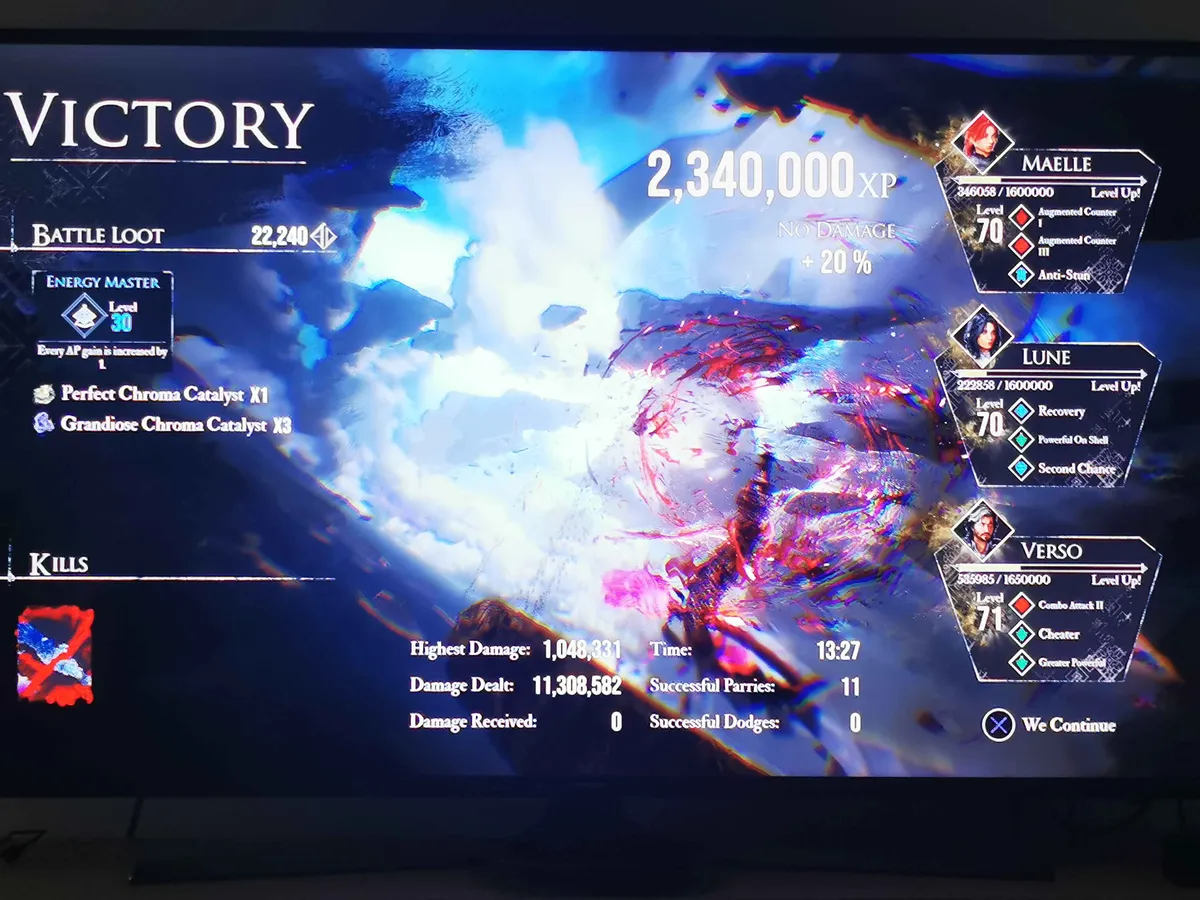
well i'm pretty sure this is even longer than my Metaphor write-up. once again, i am so sorry and so very autistic. thanks for reading
examples that i've played or heard of to illustrate my point - SNES: Chrono Trigger, Earthbound, the Final Fantasies but especially 6, the Dragon Quests, Secret of Mana (which i actually don't like but lots of people do), Terranigma, Super Mario RPG. PS2: lots of SMT but especially Persona 3 and 4, Tales of (especially Symphonia tho the PS2 version is japan-only), Kingdom Hearts, .hack, Final Fantasy 10, Dragon Quest 8, Xenosaga, Atelier Iris. DS: The World Ends With You, more SMT, more Dragon Quest, Kingdom Hearts again, Golden Sun i guess, Mario & Luigi, Radiant Historia, Devil Survivor, does Pokemon Mystery Dungeon count?↩
examples: anytime he speaks in barely veiled language to renoir in front of the party. in old lumiere, when something happens that's so contrived i actually laughed at it, separating the party such that verso is alone with maelle - upon realizing which, he suddenly seems Very Interested in taking her somewhere! and lastly, the first time you approach the manor in its entirety, where he calls maelle "alicia" and implies that he knows the masked girl that she sees in her dreams/flashbacks.↩
in Elden Ring's case, george r. r. martin of course wrote the worldbuilding and the story of the shattering for fromsoft, who then ran with it as they pleased; for Clair Obscur, the visual hook with the monolith, the number, and the paintress was established, and then combined with a short story that the lead writer (jennifer svedberg-yen) was working on at the time which became the backstory of the game and thus the act 3 reveal. source: https://youtu.be/mXLOLgC2V2Q?si=lNZ7GR0Txh8Zph4S&t=2244↩
there's a bit more to this too based on things monoco says in-game, this reddit thread gets into it a little. one of my favourite details of the game's backstory: https://www.reddit.com/r/expedition33/comments/1l1rpka/we_all_know_monoco_is_devs_dog_but_also/↩
another example of this that i didn't realize until watching jacob geller's video (linked elsewhere in this post) is if it wasn't already obvious, how aline feels about the family is also betrayed in the canvas by the existence of the painted dessendres, since she is the one who made them. renoir is featureless and decaying as if to say he is unrecognizable to her, clea is suspiciously absent - verso however looks completely normal, and he's even totally incapable of dying. alicia, while mostly normal other than ashy skin, is still notable for not receiving this "sanitizing" treatment like verso does, having retained her scars.↩
just a sidenote: i love this fading NPC conversation. it hits something in me as a divorce kid to have an older sibling level with you about how much your parents suck and trying to instill in them that they don't have to listen to or idolize either one, because they're both biased. and when she says "and if you're not having fun... do something else." idk! i have a soft spot for mean characters showing uncharacteristic kindness, so. it makes me long for more of this side of clea (which is probably the point)↩
i've referenced these a few times but the fading NPC dialogues are super fascinating, they're key to understanding certain aspects of the family's backstory. here's a compilation of all of them: https://www.youtube.com/watch?v=Cbwzf9SNLR0↩
